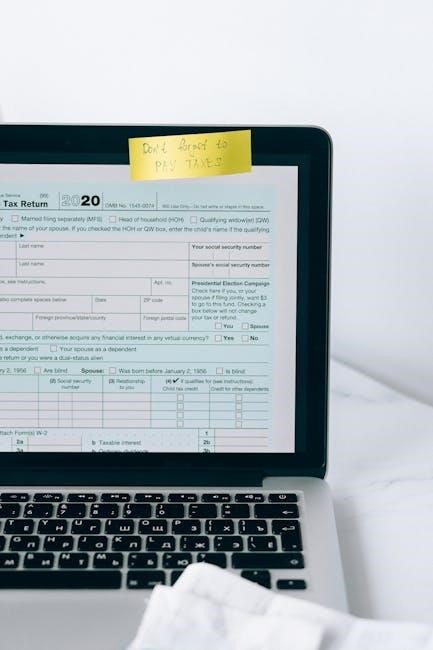Year 1 English worksheets provide foundational language skills, focusing on grammar, reading, and vocabulary; They include exercises like sentence formation, capital letters, and punctuation, ensuring engaging learning for young students․
1․1 Overview of Year 1 English Learning Objectives
Year 1 English learning objectives focus on developing foundational language skills through structured activities․ These include recognizing and writing capital letters, understanding full stops, and forming simple sentences․ Students also learn basic punctuation, such as question marks, and begin to build vocabulary through word recognition and reading exercises․ Worksheets are designed to introduce reading comprehension, encouraging children to understand short texts and answer questions․ Additionally, activities promote creative writing, such as story sequencing and sentence construction․ These objectives ensure students gain confidence in communicating effectively and develop a strong base for future language development․ Interactive exercises like word puzzles and themed worksheets make learning engaging and fun, aligning with curriculum goals for early literacy․
1․2 Importance of Worksheets in Early Language Development
Worksheets play a crucial role in early language development by providing structured, engaging activities that cater to young learners․ They offer a clear framework for practicing essential skills like grammar, punctuation, and vocabulary․ Worksheets help children develop fine motor skills through writing exercises and enhance their ability to recognize and form letters․ Interactive elements, such as word puzzles and quizzes, make learning fun and motivate students to explore language creatively․ Regular use of worksheets builds confidence and reinforces classroom lessons, allowing children to progress at their own pace․ Additionally, themed and seasonal worksheets keep content fresh and relevant, making learning exciting and tailored to different interests and occasions․

Key Components of Year 1 English Worksheets
Year 1 English worksheets focus on grammar basics, simple sentence structures, and punctuation practice, ensuring a solid foundation for early language development and literacy skills․
2․1 Grammar Basics: Capital Letters and Full Stops
Year 1 English worksheets emphasize grammar basics, starting with capital letters and full stops․ These foundational skills are introduced through engaging exercises․ Capital letters are taught for sentence beginnings and proper nouns, while full stops signal sentence endings․ Worksheets often include activities like identifying and writing capital letters, completing sentences with full stops, and correcting punctuation errors․ Interactive exercises, such as matching games and fill-in-the-blank tasks, reinforce these concepts․ These activities help students develop accuracy and confidence in using punctuation correctly․ By mastering capital letters and full stops, children build a strong foundation for writing clear, structured sentences․ This skill is essential for effective communication and progresses their language development seamlessly․
2․2 Simple Sentence Structure and Word Order
Year 1 English worksheets introduce simple sentence structure and word order through engaging activities․ Students learn to arrange words logically, starting with basic subject-verb-object patterns․ Worksheets include exercises like matching words to form sentences, identifying correct word order, and completing sentences with missing words․ Activities such as drag-and-drop tasks and fill-in-the-blank exercises help reinforce these concepts․ Many worksheets incorporate visual aids, like pictures, to make learning interactive․ Students also practice using conjunctions to create compound sentences․ These exercises ensure a strong understanding of sentence formation, which is vital for clear communication․ By mastering word order, children can express their ideas more effectively, laying the groundwork for more complex writing skills in the future․

Reading Comprehension and Vocabulary Development
Year 1 English worksheets enhance reading comprehension and vocabulary through engaging exercises․ Activities include identifying main ideas, matching words to meanings, and completing sentences with new vocabulary․
Year 1 English worksheets introduce basic reading skills through simple texts and activities․ Children learn to recognize words, understand sentences, and identify main ideas․ Worksheets often include short stories and questions to assess comprehension․ These exercises build confidence and prepare students for more complex reading tasks in later years;
3․2 Building Vocabulary Through Worksheets
Year 1 English worksheets play a vital role in expanding vocabulary by introducing new words through engaging activities․ Exercises like word matching, fill-in-the-blanks, and simple definitions help students recognize and remember words․ Many worksheets incorporate themed content, such as seasons or animals, to make learning fun and relatable․ Interactive elements like word searches and crossword puzzles further enhance vocabulary acquisition․ These activities not only improve word recognition but also encourage students to use words in context, fostering better communication skills․ By practicing regularly, children build a strong foundation for future language development․ worksheets are designed to be both educational and enjoyable, ensuring young learners stay motivated and curious about language exploration․

Punctuation Practice for Year 1 Students
Year 1 worksheets focus on basic punctuation, teaching full stops and question marks․ Exercises include identifying punctuation in sentences and correcting errors, helping students grasp sentence structure and meaning․
4․1 Correct Use of Full Stops
Mastering the correct use of full stops is a fundamental skill in Year 1 English․ Worksheets often include exercises where students identify and place full stops at the end of sentences․ These activities help children understand sentence structure and punctuation rules․ For example, students may be asked to arrange words into complete sentences and add full stops․ Additionally, worksheets may feature sentences with missing punctuation, requiring students to fill in the correct stops․ Such practices enhance reading comprehension and writing clarity․ Interactive exercises, like matching games or identifying incomplete sentences, make learning engaging․ These tools are essential for building a strong foundation in punctuation and preparing students for more complex grammar concepts in higher grades․
4․2 Understanding Question Marks
Learning to use question marks correctly is an essential punctuation skill for Year 1 students․ Worksheets designed for this purpose often include activities that help children recognize when to use question marks in sentences․ Common exercises involve identifying sentences that require question marks and writing questions based on given prompts․ For example, students might complete sentences like “______ is your favorite color?” or match questions with corresponding answers․ These activities enhance their understanding of sentence structure and punctuation rules․ Additionally, interactive exercises, such as creating yes/no questions or identifying interrogative sentences, make learning engaging․ By practicing with these worksheets, students develop the ability to form clear and grammatically correct questions, improving their communication skills and overall language confidence․

Interactive and Fun Activities in Worksheets
Interactive Year 1 English worksheets feature word puzzles, quizzes, and seasonal themes, making learning engaging while developing essential language skills through fun exercises․
5․1 Word Puzzles and Quizzes
Word puzzles and quizzes in Year 1 English worksheets are engaging tools that make learning fun and interactive․ These activities often involve tasks like arranging words to form sentences, identifying capital letters, and completing simple crosswords․ Quizzes test students’ understanding of basic grammar and vocabulary in an exciting way․ For example, matching games help students recognize question marks and full stops, while word searches introduce new vocabulary․ These exercises not only improve language skills but also enhance problem-solving abilities․ Seasonal and thematic puzzles, such as holiday-themed word hunts, add variety and keep students motivated․ By integrating these activities, worksheets ensure that learning is both enjoyable and effective, catering to different learning styles and fostering a love for English from an early age․
5․2 Seasonal and Thematic Worksheets
Seasonal and thematic worksheets are a fantastic way to make Year 1 English learning engaging and relevant․ These resources are designed around holidays, seasons, or special events, such as autumn-themed word hunts or Christmas quizzes․ By incorporating familiar themes, students connect learning to their everyday experiences, making it more relatable and fun․ For example, autumn worksheets might include activities like identifying leaves or writing short sentences about seasonal changes․ Similarly, holiday-themed sheets often feature festive vocabulary and puzzles․ These worksheets not only reinforce English skills but also foster creativity and enthusiasm․ They are particularly useful for keeping students motivated during breaks or as supplementary activities․ Seasonal themes ensure that learning remains dynamic and aligned with students’ interests and experiences throughout the year․
Year 1 English worksheets are an invaluable resource for early language development, offering a structured and engaging way to build essential skills․ From grammar and punctuation to reading comprehension and vocabulary, these worksheets cater to a wide range of learning needs․ Their interactive and thematic designs, including seasonal activities, make learning fun and relatable․ By incorporating puzzles, quizzes, and creative tasks, they keep students motivated and eager to learn․ Whether used in the classroom or at home, these resources provide a solid foundation for future academic success․ With their versatility and focus on foundational skills, Year 1 English worksheets are a cornerstone of early education, helping students grow into confident and capable learners․
